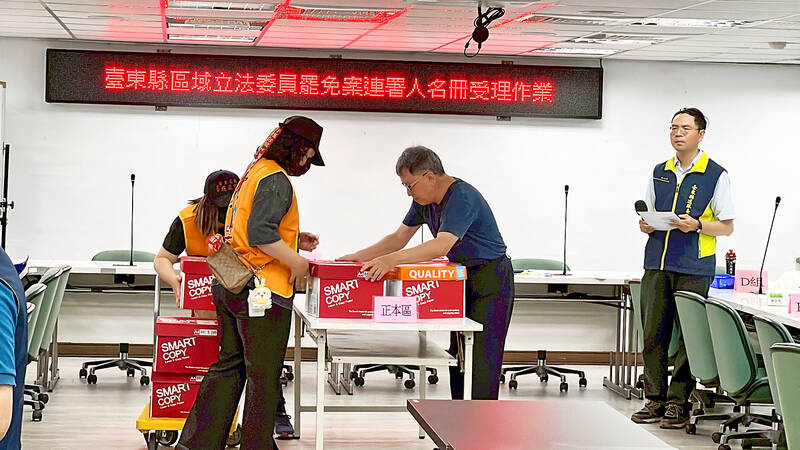Campaigners seeking to recall Chinese Nationalist Party (KMT) Legislator Huang Chien-pin (黃建賓) yesterday delivered 16,671 signatures to the Taitung County Election Commission, becoming the first in the nation to complete the second phase of signature-gathering necessary to trigger a recall election.
Hung Chuan-cheng (洪銓政), a leading organizer of the campaign, said they had gathered 180,000 signatures, but removed flawed signatures.
They needed 11,534 signatures to cross the second-phase threshold, meaning organizers exceeded their target by 44 percent, he said.

Photo: CNA
Huang had previously accused the Democratic Progressive Party (DPP) of “hunting down” political opponents in an attempt to relitigate last year’s election.
The recall campaign gathered enough signatures due to the low number of residents in his district, rather than his alleged unpopularity, he said.
The recall campaign is “bullying” county residents, and creating political strife that has annoyed the people of Taitung, he added.
The DPP only seeks to use Taitung as a tool for fighting its political rivals and has failed to serve the county’s residents, he said, citing the Ministry of Transportation and Communications on Wednesday saying it could not build a high-speed rail station in the county.
Meanwhile, campaign groups targeting KMT legislators Hung Mong-kai (洪孟楷) and Yeh Yuan-chih (葉元之) of New Taipei City on Wednesday announced that they had collected 50,592 and more than 32,000 signatures respectively in their bids to remove the lawmakers.
The group campaigning against Hung Mong-kai wrote on Facebook that it had achieved its “safe” target of 1.3 times the required threshold of 10 percent of all eligible voters in New Taipei City’s first electoral district.
Meanwhile, campaigners in Banciao District (板橋) seeking to oust Yeh in the seventh electoral district said they had collected 1.37 times the required number of signatures and plan to deliver them to the city’s election commission on Monday next week.
Hung Mong-kai said he was prepared for the challenge, urging supporters to “defend the lawmaker they trust” and voice their disagreement using their ballots in the recall vote.
Voters had voiced their disapproval of the Executive Yuan at a KMT rally on Ketagalan Boulevard in Taipei on Saturday last week, he said.
The demonstrators disagree with the Executive Yuan’s “anti-democratic” polices, said Hung Mong-kai, who won 158,596 votes, the highest in the legislative elections last year.
Yeh, a former New Taipei City councilor, who began his first four-year term in the legislature on Feb. 1 last year, said his service in the electoral district has been endorsed by local wardens and groups, adding that he believes voters can see through the DPP’s intentions and would not tolerate a recall vote he described as a showdown.
The ongoing recall campaigns were started by the ruling DPP, with caucus whip Ker Chien-ming (柯建銘) in early January calling for mass recalls to oust KMT legislators.
KMT lawmakers hold a narrow majority in the legislature and have teamed up with Taiwan People’s Party lawmakers and two independents to form an opposition majority of 62-51.

A small number of Taiwanese this year lost their citizenship rights after traveling in China and obtaining a one-time Chinese passport to cross the border into Russia, a source said today. The people signed up through Chinese travel agencies for tours of neighboring Russia with companies claiming they could obtain Russian visas and fast-track border clearance, the source said on condition of anonymity. The travelers were actually issued one-time-use Chinese passports, they said. Taiwanese are prohibited from holding a Chinese passport or household registration. If found to have a Chinese ID, they may lose their resident status under Article 9-1

Taiwanese were praised for their composure after a video filmed by Taiwanese tourists capturing the moment a magnitude 7.5 earthquake struck Japan’s Aomori Prefecture went viral on social media. The video shows a hotel room shaking violently amid Monday’s quake, with objects falling to the ground. Two Taiwanese began filming with their mobile phones, while two others held the sides of a TV to prevent it from falling. When the shaking stopped, the pair calmly took down the TV and laid it flat on a tatami mat, the video shows. The video also captured the group talking about the safety of their companions bathing

A classified Pentagon-produced, multiyear assessment — the Overmatch brief — highlighted unreported Chinese capabilities to destroy US military assets and identified US supply chain choke points, painting a disturbing picture of waning US military might, a New York Times editorial published on Monday said. US Secretary of Defense Pete Hegseth’s comments in November last year that “we lose every time” in Pentagon-conducted war games pitting the US against China further highlighted the uncertainty about the US’ capability to intervene in the event of a Chinese invasion of Taiwan. “It shows the Pentagon’s overreliance on expensive, vulnerable weapons as adversaries field cheap, technologically

Starting on Jan. 1, YouBike riders must have insurance to use the service, and a six-month trial of NT$5 coupons under certain conditions would be implemented to balance bike shortages, a joint statement from transportation departments across Taipei, New Taipei City and Taoyuan announced yesterday. The rental bike system operator said that coupons would be offered to riders to rent bikes from full stations, for riders who take out an electric-assisted bike from a full station, and for riders who return a bike to an empty station. All riders with YouBike accounts are automatically eligible for the program, and each membership account